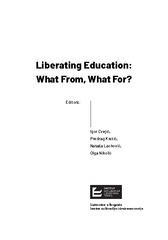Приказ основних података о документу
The Emotional Base of Educational Process: Beyond Care for Wellbeing
| dc.contributor | Cvejić, Igor | |
| dc.contributor | Krstić, Predrag | |
| dc.contributor | Lacković, Nataša | |
| dc.contributor | Nikolić, Olga | |
| dc.creator | Cvejić, Igor | |
| dc.date.accessioned | 2022-03-01T10:17:10Z | |
| dc.date.available | 2022-03-01T10:17:10Z | |
| dc.date.issued | 2021 | |
| dc.identifier.isbn | 978-86-80484-79-2 | |
| dc.identifier.uri | http://rifdt.instifdt.bg.ac.rs/123456789/2514 | |
| dc.description.abstract | This paper starts from the presupposition that the necessity of the education of “immatures” does not rest primarily on biological or empirical reasons, but on normative ones. As argued by Tamar Schapiro (Shapiro 1999), on a recognition of moral autonomy and responsibility. This immediately opens the problem which Schapiro (ibid) calls a “problem of childhood”. On the one hand, autonomy is not something that (passively) happens. On the other hand, autonomy does not arise only from a set of choices and actions of immatures. Thus, the main aim of education could be overcoming the addressed problem. In the second part of the article, I will address Schapiro’s solution, as well as criticisms of that solution. However, the central goal of this paper will be to designate essential emotional relations between the educator and the learner. First, we must consider that an educator must be capable of showing care for a learner perceived as an autonomous agent, beyond (usually patronizing) care for wellbeing, even if this care is no more than therapeutic trust. To be more precise, an educator needs to have emotional capacities to care for that which the learner cares for, i.e. that which Bennet W. Helm calls care about an agent as such. In other words, emotional processes must include a recognition of learners’ emotions. This is still not enough, because this one-sided (weak) asymmetric relation cannot explain how the educator’s authority could influence learner’s autonomy. In order for this to happen, educational process must involve a mutual engagement between the educator and the learner, so learners can adopt the influence of the educator’s evaluations on the basis of their own autonomous evaluative perspective, without undermining their own autonomy. This is the relation we paradigmatically find in friendship. Thus, educational processes seem to have to involve (quasi-)friendship without equality. I will argue for an alternative view – to understand educational processes as joint engagements, involving mutual care between its actors, who treat each other as “one of us”. | sr |
| dc.language.iso | en | sr |
| dc.publisher | Beograd : Institut za filozofiju i društvenu teoriju | sr |
| dc.relation | info:eu-repo/grantAgreement/MESTD/inst-2020/200025/RS// | sr |
| dc.rights | openAccess | sr |
| dc.rights.uri | https://creativecommons.org/licenses/by-nc-nd/4.0/ | |
| dc.source | Liberating Education: What From, What For? | sr |
| dc.subject | emotion | sr |
| dc.subject | autonomy | sr |
| dc.subject | emancipation | sr |
| dc.subject | care | sr |
| dc.subject | childhood | sr |
| dc.title | The Emotional Base of Educational Process: Beyond Care for Wellbeing | sr |
| dc.type | bookPart | sr |
| dc.rights.license | BY-NC-ND | sr |
| dc.type.version | publishedVersion | sr |
| dc.identifier.fulltext | http://rifdt.instifdt.bg.ac.rs/bitstream/id/8877/bitstream_8877.pdf | |
| dc.identifier.rcub | https://hdl.handle.net/21.15107/rcub_rifdt_2514 |

